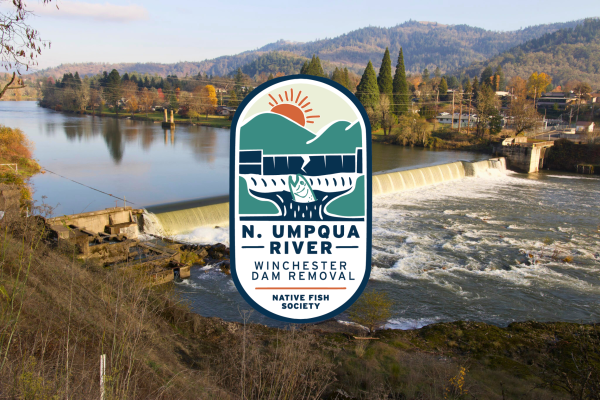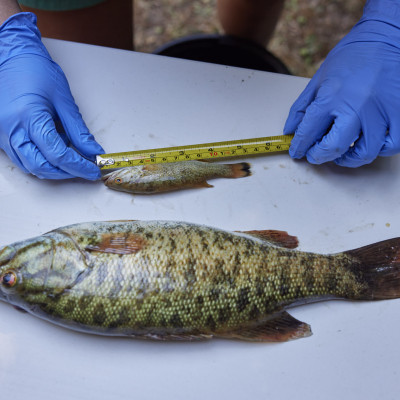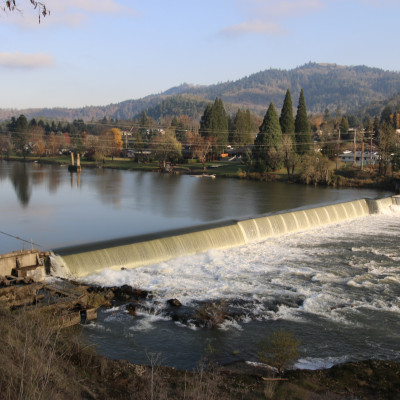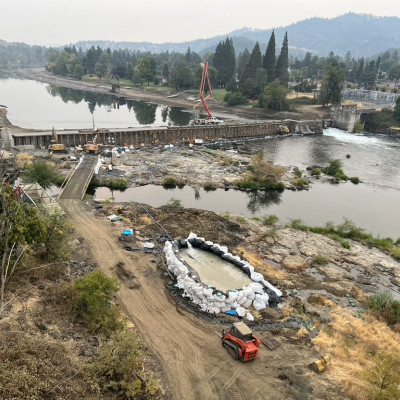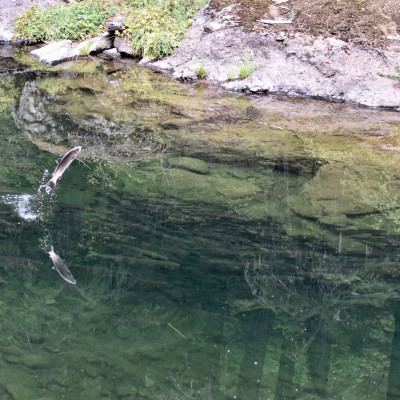The North Umpqua River and its wild fish are invaluable public treasures for our community and our state. For decades, these resources have been diminished by Winchester Dam, a structure whose sole purpose is to provide recreation for a few private homeowners. The dam owners, Winchester Water Control District, have failed to maintain the structure for the past 30 years. This neglect has resulted in major infrastructure problems that threaten our fish, water quality, and community safety. In 2023, attempted dam maintenance resulted in the mortality of hundreds of thousands of Pacific Lamprey, water quality violations, and blocked volitional fish passage. But there is hope. Native Fish Society is invested in our mission of restoring the North Umpqua River to its former glory, reviving wild, native fish population and returning the river to a free-flowing state, providing unimpeded access to more than 160 miles of cold water habitats for native fish.
The Threat:
Winchester Dam is ranked as one of Oregon's highest priorities for fish passage correction because it impedes access to high-quality habitat for salmon and steelhead.
Our key areas of focus on the North Umpqua are Hydropower (barrier impediment) and Habitat. Learn more about the science behind the 5 H’s and their importance to the revival of wild abundance here.
Our Goal:
Native Fish Society's goal is to return the North Umpqua to a free-flowing river, restoring access to over 160 miles of habitat and reducing migration delay and harm to multiple species, including Coho, Spring Chinook, summer and winter Steelhead, and Lamprey.
How We Are Working To Achieve Our Goal:
It is our hope that the iconic North Umpqua is restored to a free-flowing river. It would provide extensive opportunities for wild native fish to return to their homewaters and spawn.
Native Fish Society is part of the Winchester Dam Coalition comprised of 17 conservation and recreational organizations working to bring the rule of law and regulation to Winchester Dam. Our coalition made an offer to the Winchester Water Control District to remove the dam for little to no cost to the homeowners. This offer still stands to help benefit everyone from Douglas County and the state of Oregon.
Successes & Accomplishments to Date:
Held Winchester Water Control District accountable for fines for polluting the river with green concrete during a botched 2018 repair at the south side of the dam by intervening in the Oregon DEQ fines.
Advocacy has required an updated Emergency Action Plan required by Oregon Dam Saftey in case of unexpected dam failure
Winchester Water Control District is required to obtain permits for future work at the dam site.
Native Fish Society extensively documented the horrific construction in the summer of 2023, reporting numerous permit violations to state and federal agencies.
Identified, documented, and publicized the harm caused by the insufficient fish ladder that does not meet state or federal regulations.
Educated the community and advocates about the harm Winchester Dam causes to native migratory fish.
How Can You Help?
Get involved!
It is clear that the Winchester Water Control District is neither capable nor willing to responsibly maintain and operate Winchester Dam on the North Umpqua River. It's crucial to keep reminding your elected officials of the harm this dam inflicts on the fish and wildlife in our state. Take a few minutes and complete the most recent Action Alert asking Oregon elected officials to move forward with holding Winchester Water Control District Accountable.
You can help make a difference for the North Umpqua River and its wild, native fish by volunteering, making a donation, or spreading the word about the importance of restoring this precious resource. Send us a message if you have any questions or would like to be notified of any upcoming volunteer opportunities and/or Action Alerts for the North Umpqua River.
For these reasons and many more, Native Fish Society is dedicated to protecting and restoring the North Umpqua into a wild and free river!
For more information on Winchester Dam or to learn how you can help out, please contact Executive Director Mark Sherwood at mark@nativefishsociety.org.
